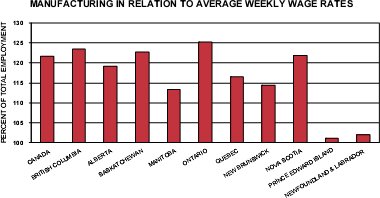- Manufacturing accounts for 18% of the provincial workforce in Ontario and Quebec,
and for 10% or more in British Columbia, Manitoba, New Brunswick, and Nova Scotia.
- Canadian manufacturing boasts a highly skilled workforce. Production workers
operate complex automation systems and new technologies. Manufacturers depend
on skilled
trades people, designers, and engineers. Employees are engaged in finance,
marketing, sales, and service, as well as in research, business management,
and information
technology.
- Over 95% of Canada’s manufacturing workforce is employed in full-time jobs.
- Wages and salaries in Canada’s manufacturing sector reflect the skills and
productivity performance of its employees. Weekly wages in manufacturing are
22% higher than the national average calculated across all sectors of the economy.
Manufacturing wage rates exceed economy-wide averages in all provinces, with the
highest earnings in Ontario, Saskatchewan, Alberta, and Nova Scotia.
Manufacturing is a knowledge-intensive business. Manufacturers invest more in new technologies,
machinery and equipment, and the construction of production facilities than any other business
sector in the country. Canadian manufacturers invested over $26 billion in research and development,
new technology, and production facilities in 2003. That same year, they accounted for 62% of all
private sector research and development spending in Canada.
A prosperous manufacturing sector is critical to Canada’s economic future, and to the lives of
each and every Canadian. Our standard of living depends on the wealth-generating capacity of
manufacturers across Canada – on their ability to innovate, continuously improve productivity,
and deliver customer value. In this regard, manufacturing has become an even more important
contributor to the economic prosperity of Canadians over the past 15 years.
